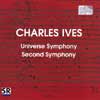Ives Universe Symphony; Symphony No. 2
A fine performance of this remarkable completion of Ives’s ‘Unfinished’
View record and artist detailsRecord and Artist Details
Composer or Director: Charles Ives
Genre:
Orchestral
Label: Col legno
Magazine Review Date: 7/2004
Media Format: CD or Download
Media Runtime: 75
Mastering:
Stereo
DDD
Catalogue Number: WWE1CD20074

Tracks:
| Composition | Artist Credit |
|---|---|
| Universe Symphony |
Charles Ives, Composer
Charles Ives, Composer Christian Voss, Conductor Johannes Kalitzke, Conductor Larry Austin, Conductor Michael Schmidtsdorff, Conductor Michael Stern, Conductor Saarbrücken Radio Symphony Orchestra |
| Symphony No. 2 |
Charles Ives, Composer
Charles Ives, Composer Michael Stern, Conductor Saarbrücken Radio Symphony Orchestra |
Author: Peter Dickinson
Ives never finished his Universe Symphony but he left sketches and an open invitation for others to do so. David Porter completed two sections in 1993; then came Larry Austin’s version, premièred in 1994, followed by independent European performances including the one recorded here; a further realisation by Johnny Reinhard was launched in New York in 1996. Austin was the first to complete Ives’ scheme after some 20 years of dedicated immersion during which he used the material as a basis for several works of his own.
The Universe Symphony is Ives at his most exploratory. Its rhythmic technique derives from his number workings in pieces like the Tone Roads; its elaborate superimpositions, with five conductors credited, are comparable to the second movement of the Fourth Symphony; and what might be called its cosmological speculation relates to that symphony as well as The Unanswered Question. But there are no quotations and the overall result is unique.
On the Cincinnati recording everything seems to emerge from a lengthy near-silence, which is actually the long, low ‘Earth Chord’ out of which emerge various rhythmic systems articulated through independent percussion groups. Any clicks in the first two minutes of the Saarbrücken recording, which is live, must stem from audience movement. When the percussion gets going the Saarbrücken sound is more vivid, less distant. It has two prominent baleful bells, a perfect fourth apart, whereas the Cincinnati version emphasises one. So there are differences between the two recordings, partly through passages involving improvisation, but both of them build inexorably to transcendental climaxes. The second half represents immensities – the history of the world through past, present and future – but when the textural furore is over the bell tolls for heaven and ‘the rise of all to the spiritual’.
There’s plenty of interest in comparing these two performances of Austin’s remark-able achievement: he is an assistant conductor in the German recording and his documentation is more detailed than with the earlier release. Otherwise, the Saarbrücken Symphony No 2 is effective enough but the Cincinnati coupling of Orchestral Set No 2 with The Unanswered Question is more appropriate.
The Universe Symphony is Ives at his most exploratory. Its rhythmic technique derives from his number workings in pieces like the Tone Roads; its elaborate superimpositions, with five conductors credited, are comparable to the second movement of the Fourth Symphony; and what might be called its cosmological speculation relates to that symphony as well as The Unanswered Question. But there are no quotations and the overall result is unique.
On the Cincinnati recording everything seems to emerge from a lengthy near-silence, which is actually the long, low ‘Earth Chord’ out of which emerge various rhythmic systems articulated through independent percussion groups. Any clicks in the first two minutes of the Saarbrücken recording, which is live, must stem from audience movement. When the percussion gets going the Saarbrücken sound is more vivid, less distant. It has two prominent baleful bells, a perfect fourth apart, whereas the Cincinnati version emphasises one. So there are differences between the two recordings, partly through passages involving improvisation, but both of them build inexorably to transcendental climaxes. The second half represents immensities – the history of the world through past, present and future – but when the textural furore is over the bell tolls for heaven and ‘the rise of all to the spiritual’.
There’s plenty of interest in comparing these two performances of Austin’s remark-able achievement: he is an assistant conductor in the German recording and his documentation is more detailed than with the earlier release. Otherwise, the Saarbrücken Symphony No 2 is effective enough but the Cincinnati coupling of Orchestral Set No 2 with The Unanswered Question is more appropriate.
Discover the world's largest classical music catalogue with Presto Music.

Gramophone Digital Club
- Digital Edition
- Digital Archive
- Reviews Database
- Full website access
From £8.75 / month
Subscribe
Gramophone Full Club
- Print Edition
- Digital Edition
- Digital Archive
- Reviews Database
- Full website access
From £11.00 / month
Subscribe
If you are a library, university or other organisation that would be interested in an institutional subscription to Gramophone please click here for further information.




